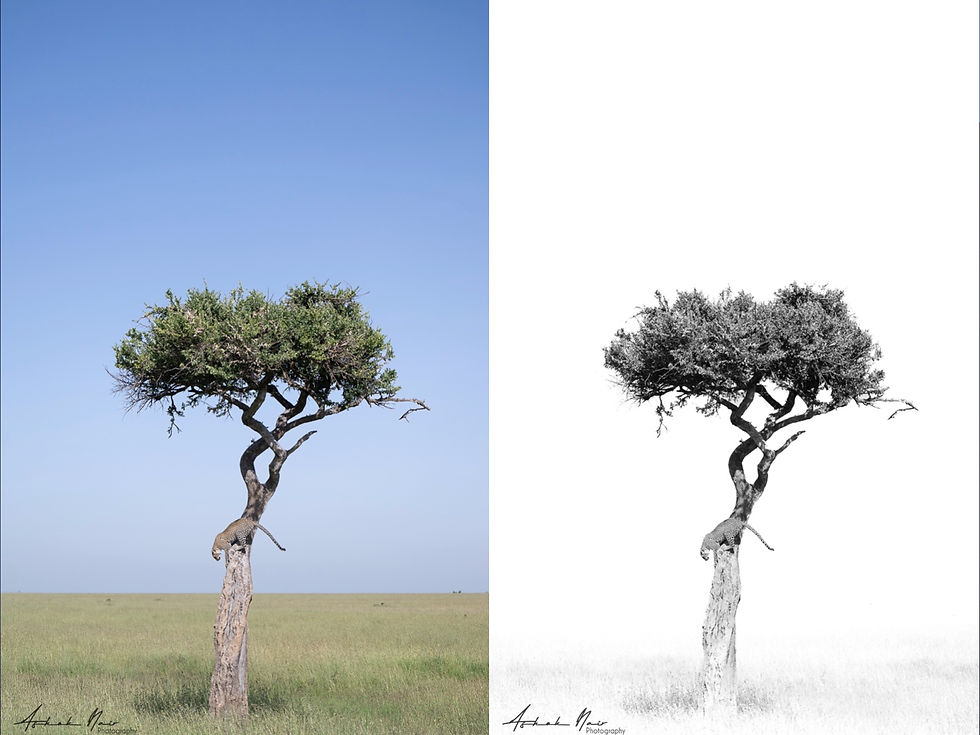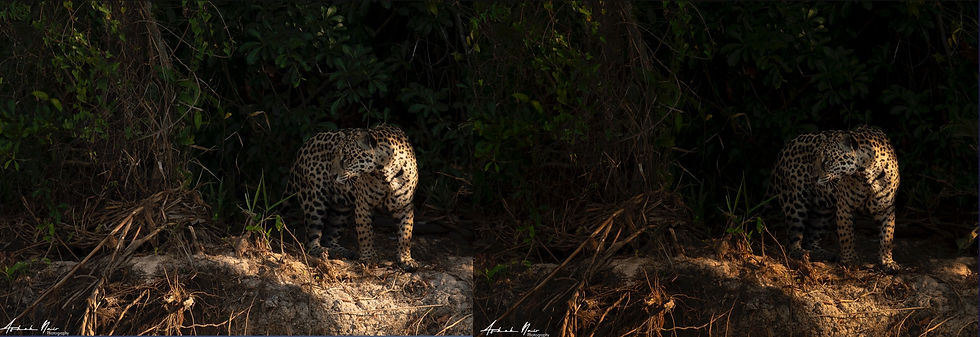Post Processing : How much is right ?
- vidyashok
- Apr 19, 2024
- 5 min read
Recently, a photographer, I admire and follow, David DuChemin, put out a short reel on Insta. He talked about the adverse reactions that he had received after posting a Before and After image from his trip in Kenya.
Some…or many of the comments were critical about the extent of post processing that he had done on the image.
One comment, and David talked about it, said – “ I am not comfortable with this.”
I am not comfortable with what you have done.
Sounds ominous.
Let’s look at where the viewer comes in... IF the viewer comes in at all.
And also touch upon about this wonderfully important, yet occasionally abstract concept of ethics in photography.
As is necessary in most cases, let us start at the beginning.
What is the purpose of photography ? Does it have to be always absolutely accurate and anything other than that... unethical ?
Can we say that it depends on what the photographer is trying to achieve ?
If I am a wartime photojournalist, honesty and accuracy has to be my calling card. I am communicating facts and conveying news and I HAVE to be seen as being credible.
If I am a wildlife photographer who is the first person to go to a specific forest ( if only such places exist today ! ), I might be focused on documenting what I see. I might want to convey an accurate depiction of what I am seeing for the world to know more about it and not some creative razzmatazz.
If I am telling a story of how I see the world around me, I might do it differently from the way I would do it if I were making a documentary. I might take a wide angle shot of a person, exaggerating some aspect of his or her personality. I might underexpose a scene to communicate a sense of intrigue which might not have been visible to the naked eye, but an emotion I experienced.
Some photographers might view their work as pieces of art where they use tools at their disposal to create.
The world exists in colour. Showing an image in black and white is an artistic choice. The world moves the way it does. Slowing down the shutter speed to convey the sense of motion is a deliberate choice. Moving the camera to make a photograph look like a painting is a very intentional choice.
I am trying to tell a story, to show an emotion to the viewer and all these choices are my tools to convey my message.
So, where does the viewer come in ?
Well...if the viewer doesn’t like my work, the viewer will reject me.
If I am a war reporter, my credibility should be my biggest asset. My viewers rejecting me will matter.
However, if I, as a photographer am trying to create something that is my vision, I am not going to be overly concerned with what the viewer feels. I am first creating it for myself. If the viewer appreciates it, great…who doesn’t like validation ? If not, I might shrug my shoulders and say, ‘big deal’ and continue trying to create.
The question comes…what about the line that holds a big sign saying Thou Shalt Not Cross ?
Simple. It doesn't exist.
We shall all form our own rules of what we are ok with and what we are not. I might not like some of the colours that some give to sunsets, but that is my problem.
A good friend of mine refuses to crop his images. Not even one teeny weeny bit. That is his bar. His standard is to ensure that the entire composition is done in the field and he wants to excel at that.
I have a few of my own. I will not remove an offending blade of grass that might pop up right in front of the eye of a subject. I think, that is something that I should have taken care of while photographing. Removing that single blade does nothing to the heart or the accuracy of the story that the image conveys, but it’s my own little rule. I also try to avoid over saturating the skies both in camera and later in post processing.
I will also not judge anyone who does all this. They will have their own rules. Or not. Not my problem.
We also tend to be a little puritanical about this entire debate about using software for post processing. ( The word 'Photoshop' has become a nasty little verb with a sordid life of its own, hasn’t it ? ).
If we make changes in the camera setting that is fine. For example, if I increase the White Balance to an unreal number in the camera, that is fine. Creating the same effect later in post processing is ..."hmmm...you changed it in post processing? HMMMM..."
Strange.
Now, that doesn’t mean that viewers should not share their opinion at all. Far from it.
I love feedback. I have many of my good friends tell me that they don’t like my slow shutter experiments. ( I continue with that ) My attempt at a creative image of a giraffe drinking water has become a continuing source of leg pulling for a few dear friends. ( Friends...eye roll ) I had a lovely exchange with another friend on how minimalistic should one go in minimalistic compositions. ( Made me think )
Some of this feedback is invaluable. However, like with any feedback, I will consider their views and agree with it or not. And, of course, I too will give my feedback if asked, or sometimes, unsolicited. Whether the photographer on the other side, agrees with me or acts on my feedback should not be my problem.
However, “ I don’t approve …” has the sound of God looking down at you with immeasurably reproachful and regretful eyes.
You don't ( or should not ) create, while worrying about the reactions. You create for yourself first.
David duChemin, elaborated on this in his newsletter, and I don’t think, I can improve on his concluding lines, so let me just repeat his words ( https://davidduchemin.com/2024/04/a-word-about-art-making/ )
"You will wrestle with your own discomfort daily. Don't let the discomfort of others become your burden. And don’t allow their rules to become your chains."
Let me share some of the changes that I have made while making my images.

A leopard descending a tree is special. I thought that giving it a stylised
black and white treatment might make it more dramatic.
Everyone knows it is not an accurate representation of the real scene

One of my favourite images from Brazil. I darkened the shadows, increased the warmth of the image. It was spectacular to watch the jaguar emerge from the dark forests and
I wanted to convey that sense of tension, excitement of the moment that I experienced

A photo or a painting ? Art or reality ?
( A technique called ICM - Intentional Camera Movement which I am struggling to learn )

Same day, same place, same morning...but I tried different treatments through the camera settings

Same shot. Different treatments. The one on the right was suggested by
Rahul Sachdev and I totally prefer his view

Too minimalistic? Maybe.

Many people couldn't fathom this image...I love it :)
( its a giraffe, under a tree, raising its neck after a drink with the water trailing from its mouth )
What do you think ? Both photographers and viewers...I am keen to hear your views.
Cheers !
Ashok




Nice article, more relevant now, with AI being part of Photoshop. I prefer to show my images the way I like it. Take feedback from viewers and dont get upset with their views. Some could improve the image/composition etc. ( Very subjective)
As a viewer, I get it.. Everyone's aesthetic tastes are different and it is possible I may not like a particular treatment. Big deal. The creator liked it and has every right to do it their way :-) Heightening or lessening an effect (light/movement/color) based on the creator's desired impact - no one should have a problem with that. Not sure though if I would say there is no line. Something done to deliberately mislead for example.. That's obviously not the intent behind most creations. But if that's the case, how would I respond ? Probably need to think more about that..